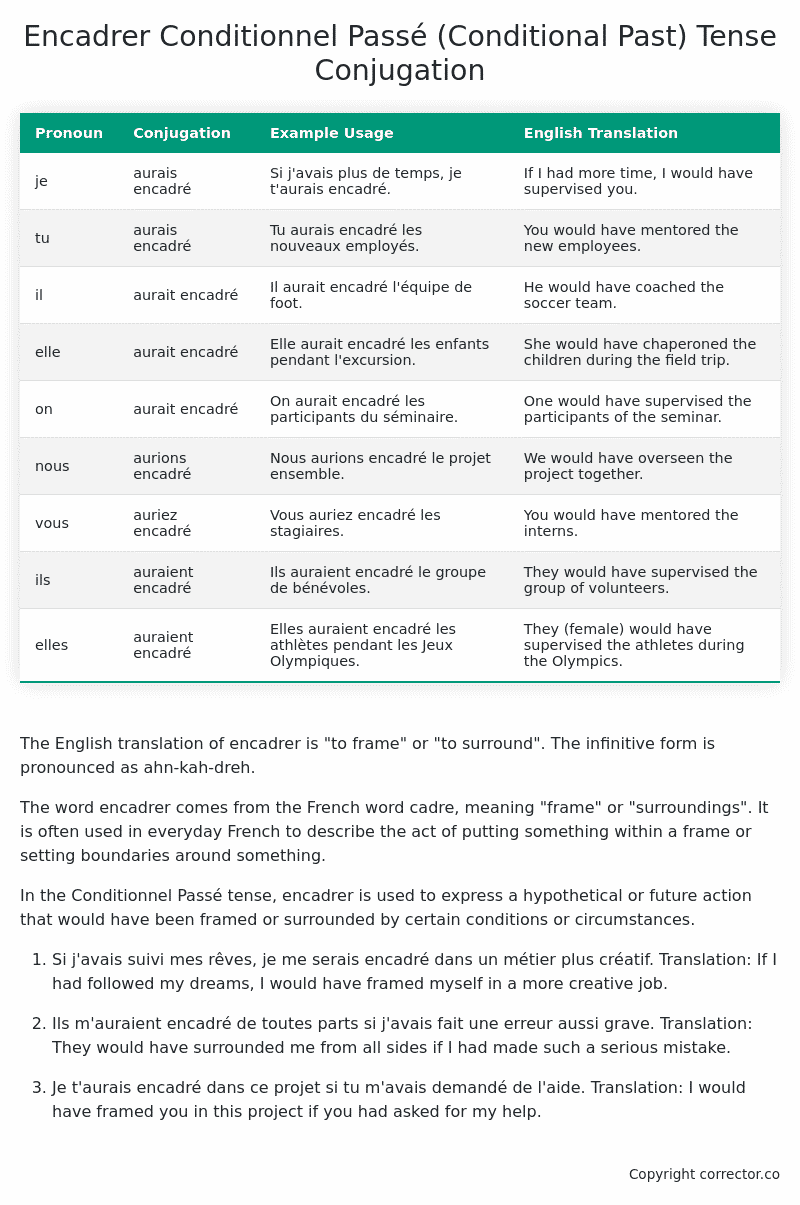Conditionnel Passé (Conditional Past) Tense Conjugation of the French Verb encadrer
Introduction to the verb encadrer
The English translation of encadrer is “to frame” or “to surround”. The infinitive form is pronounced as ahn-kah-dreh.
The word encadrer comes from the French word cadre, meaning “frame” or “surroundings”. It is often used in everyday French to describe the act of putting something within a frame or setting boundaries around something.
In the Conditionnel Passé tense, encadrer is used to express a hypothetical or future action that would have been framed or surrounded by certain conditions or circumstances.
-
Si j’avais suivi mes rêves, je me serais encadré dans un métier plus créatif.
Translation: If I had followed my dreams, I would have framed myself in a more creative job. -
Ils m’auraient encadré de toutes parts si j’avais fait une erreur aussi grave.
Translation: They would have surrounded me from all sides if I had made such a serious mistake. -
Je t’aurais encadré dans ce projet si tu m’avais demandé de l’aide.
Translation: I would have framed you in this project if you had asked for my help.
Table of the Conditionnel Passé (Conditional Past) Tense Conjugation of encadrer
| Pronoun | Conjugation | Example Usage | English Translation |
|---|---|---|---|
| je | aurais encadré | Si j’avais plus de temps, je t’aurais encadré. | If I had more time, I would have supervised you. |
| tu | aurais encadré | Tu aurais encadré les nouveaux employés. | You would have mentored the new employees. |
| il | aurait encadré | Il aurait encadré l’équipe de foot. | He would have coached the soccer team. |
| elle | aurait encadré | Elle aurait encadré les enfants pendant l’excursion. | She would have chaperoned the children during the field trip. |
| on | aurait encadré | On aurait encadré les participants du séminaire. | One would have supervised the participants of the seminar. |
| nous | aurions encadré | Nous aurions encadré le projet ensemble. | We would have overseen the project together. |
| vous | auriez encadré | Vous auriez encadré les stagiaires. | You would have mentored the interns. |
| ils | auraient encadré | Ils auraient encadré le groupe de bénévoles. | They would have supervised the group of volunteers. |
| elles | auraient encadré | Elles auraient encadré les athlètes pendant les Jeux Olympiques. | They (female) would have supervised the athletes during the Olympics. |
Other Conjugations for Encadrer.
Le Present (Present Tense) Conjugation of the French Verb encadrer
Imparfait (Imperfect) Tense Conjugation of the French Verb encadrer
Passé Simple (Simple Past) Tense Conjugation of the French Verb encadrer
Passé Composé (Present Perfect) Tense Conjugation of the French Verb encadrer
Futur Simple (Simple Future) Tense Conjugation of the French Verb encadrer
Futur Proche (Near Future) Tense Conjugation of the French Verb encadrer
Plus-que-parfait (Pluperfect) Tense Conjugation of the French Verb encadrer
Passé Antérieur (Past Anterior) Tense Conjugation of the French Verb encadrer
Futur Antérieur (Future Anterior) Tense Conjugation of the French Verb encadrer
Subjonctif Présent (Subjunctive Present) Tense Conjugation of the French Verb encadrer
Subjonctif Passé (Subjunctive Past) Tense Conjugation of the French Verb encadrer
Subjonctif Imparfait (Subjunctive Imperfect) Tense Conjugation of the French Verb encadrer
Subjonctif Plus-que-parfait (Subjunctive Pluperfect) Tense Conjugation of the French Verb encadrer
Conditionnel Présent (Conditional Present) Tense Conjugation of the French Verb encadrer
Conditionnel Passé (Conditional Past) Tense Conjugation of the French Verb encadrer (this article)
L’impératif Présent (Imperative Present) Tense Conjugation of the French Verb encadrer
L’infinitif Présent (Infinitive Present) Tense Conjugation of the French Verb encadrer
Struggling with French verbs or the language in general? Why not use our free French Grammar Checker – no registration required!
Get a FREE Download Study Sheet of this Conjugation 🔥
Simply right click the image below, click “save image” and get your free reference for the encadrer Conditionnel Passé tense conjugation!

Encadrer – About the French Conditionnel Passé (Conditional Past) Tense
Formation
Common Everyday Usage Patterns
Expressing Unreal Past Scenarios
Polite Requests or Suggestions
Expressing Doubt or Uncertainty
Interactions with Other Tenses
Conditional Present
Indicative Past Tenses
Conditional Future
Summary
Want More?
I hope you enjoyed this article on the verb encadrer. Still in a learning mood? Check out another TOTALLY random French verb conjugation!


